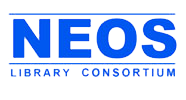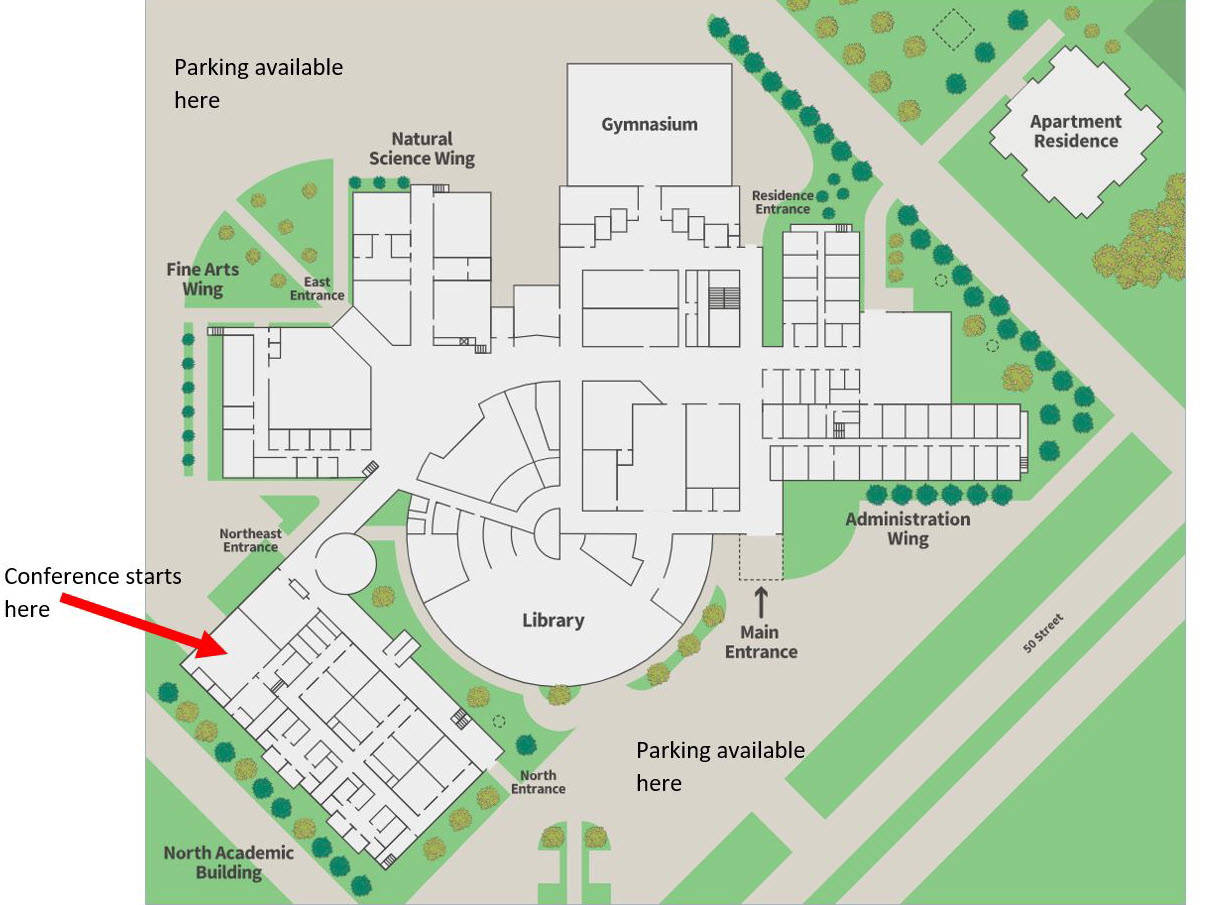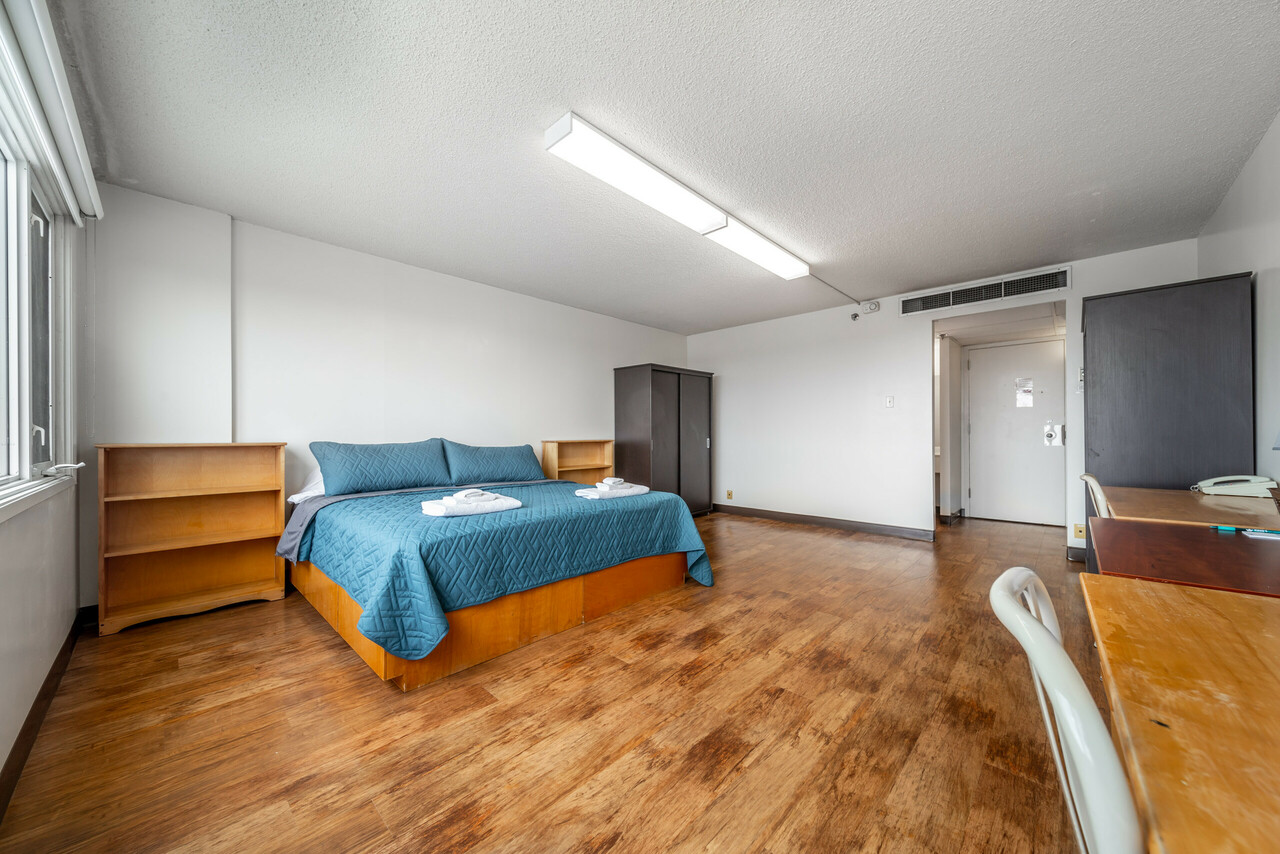The in-person component of the 2023 NEOS Mini Conference was held on Friday, June 9th at The King’s University, 9125 50th Street, Edmonton. Online versions of some presentations were offered the following week via live Zoom sessions.
The Mini Conference is organized annually by the NEOS Continuing Education Committee and is offered at no charge to staff from NEOS member libraries.
2023 NEOS Mini Conference Schedule:
Registration & Refreshments (8:30 am – 9:00 am)
Welcome & Keynote Speaker (9:00 am – 10:15 am) – Room N102
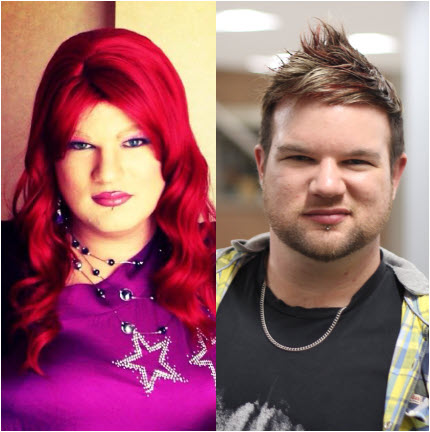
Tommy Mayberry, PhD (he/she/they) is a scholar, professional, and academic drag queen and is the Executive Director of the Centre for Teaching and Learning at the University of Alberta. As a sought-after speaker on the topics of “Gender Pronouns and Cultures of Respect,” Tommy has presented their work nationally as well as internationally and with corporate industry and business partners such as SurveyMonkey, LinkedIn, and Liberty Mutual Insurance. If you’re a fan of reality TV and especially of the drag queen competition series RuPaul’s Drag Race, you might also be interested to know that Tommy has co-edited an award-winning book, RuPedagogies of Realness: Essays on Teaching and Learning with RuPaul’s Drag Race (McFarland 2022) and currently has a follow-up “she-quel” edition in the works, too!
Confessions of an “EDI Killjoy”: Just Acronyms… Or Academic Justice
Tommy Mayberry
Presentation Slides and Notes
Building off – and riffing on – critical race theorist and postcolonialist scholar Sara Ahmed and her figure of the “feminist killjoy,” this talk situates and presents Dr. Tommy Mayberry and their work across equity and inclusivity as an “EDI killjoy”…as someone whose “failure to be happy [in this work] is [often] read as sabotaging the happiness of others.”[1] While there are victories, yes, and there are increments of powerful progress, there is still much to be done, and this work is and remains incredibly difficult, demanding, and intimidating work to do and to keep doing.
How do we, then, as leaders (instructors, academics, librarians, professionals, allies, etc.), incorporate principles of “EDI,” “DE&I,” “JEDIA,” etc. into our teachings, programs/programming, and pedagogies toward building – and sustaining – more inclusive teaching, learning, and professional environments for us and for those we work with? Join Dr. Tommy as they critically, but still caringly, share how these terms as acronyms can (and often do) forget and leave behind important aspects of each respective letter as they become homogenized, totalized, and monolithic in their nounifications.
At the heart of these nounified acronyms is the larger, critical project of academic justice. And it is through academic justice as a more truthful umbrella term for the hard, hard work of decolonization, anti-racism, Indigenization, and equity, diversity, inclusivity and belonging, as well as access and accessibility, that we can unlock and active real change into our teaching practices.
- Sara Ahmed, The Promise of Happiness, Duke UP, 2010: 66.
Break (10:15 am – 10:45 am)
Breakout Sessions 1 (10:45 am – 11:30 am)
1A: Make the Changes You Wish to See: Name and Subject Authority Work at the University of Alberta (Room N208)
Brian Stearns (University of Alberta)
For the past few years, NEOS member libraries have been busy working to improve subject headings relating to Indigenous peoples and topics. That is not all the authority work that has been happening though! Learn about the breadth of work relating to names and subjects that has been happening, and how the entire NEOS community benefits from this work.
1B: New Library Services Platform (LSP) Update (Room N209)
Ivan Chan and Weiwei Shi (University of Alberta)
The process for moving to a new Library Services Platform is beginning. This session will provide an update for where we are now, the process going forward and the implications for NEOS libraries.
1C: Speed Networking (Room N219)
Speed networking is a structured form of networking that allows participants to meet and have brief one-on-one conversations with many people in a short span of time (about ten to twelve people in an hour). The goal is to meet new people and discover shared connections or common interests. This session will be an opportunity for individual NEOS staff to develop their professional contacts within NEOS, share their personal experiences working in NEOS and hear about the experiences of others. The open-ended format, guided by a facilitator, allows conversations to follow any topic of mutual interest. No preparation is required, but session attendees should bring a dozen or more business cards or prepared slips with their contact information.
Lunch, Updates and Awards (11:30 am – 1:00 pm) at The Level Coffee House
Breakout Sessions 2 (1:00 pm – 1:45 pm)
2A: Creating an information literacy curriculum map (Room N208)
Leah Townsend (NorQuest College)
Instructional librarians have many details to consider when it comes to what and how they teach. Institutional priorities, the ACRL Framework, strategic plans, educational design, and discipline-specific instruction requests – how can we put all of this together to create a unified, intentional curriculum? Join this session to learn about the NorQuest College Library’s recent experience with the curriculum mapping process and our preliminary results. See examples for visualizing the relationships between competing priorities, and suggestions for drafting information literacy program outcomes and mapping to lesson objectives. Attendees will leave this session with an understanding of the process of mapping their own institution’s information literacy curriculum, and suggestions and materials to assist in the mapping process.
2B: The Path Ahead: Cataloguing Strategies 2023 Goals and NEOS (Room N219)
Ian Bigelow and Abigail Sparling (University of Alberta)
The Cataloguing Strategies Unit (CATS) at the University of Alberta Library (UAL) has seen considerable change in the past few years, and can expect many more to come. This year units and teams at UAL went through a goal setting process. This presentation will outline the 2023 goals for CATS, with a particular focus on where it aligns with work across NEOS. In particular, we will discuss adapting to ensure core operations are supported, Decolonizing Description, ongoing work for the Linked Data Implementation Plan, Library Service Platform Migration planning and initial steps, work towards and open data policy and portal, and associated discovery considerations. NEOS has operated for many years through a shared catalogue (system and data). As such, the work mapped out in the CATS Goals for the coming year and beyond will have a significant impact on the future of NEOS. Key takeaways include an understanding of the challenges and opportunities ahead.
2C: The King’s Library Tour
Join The King’s Library staff for a tour of the Library!
Did you know that King’s University is located in the former Capilano Inn and the Library is in the former banquet hall and bar? The space has certainly changed and we invite you to come and see how.
Break (1:45 pm – 2:00 pm)
Breakout Sessions 3 (2:00 pm – 2:45 pm)
3A: Transitioning to an Integrated Virtual Reference Platform at the University of Alberta Library: Why, How, and What’s Next (Room N209)
Angie Mandeville, Lindsay Johnston, Kara Blizzard (University of Alberta)
Virtual reference services, including email, chat, and embedded forms, are an integral channel for communication with library users at the University of Alberta Library (UAL). In 2021, the Virtual Reference Working Group (VRWG) was formed to map current virtual reference services provided across various service points and platforms and to propose a more cohesive model that would take advantage of available technologies. After conducting internal consultation, a literature review, and an environmental scan, VRWG recommended that UAL subscribe to LibAnswers as an integrated virtual reference platform. This approach would minimize the number of points of email contact that library users need to navigate, establish a single platform for frontline staff to use for addressing users’ queries, ensure a more seamless referral process to other library staff across various departments, and facilitate the creation of a knowledge base with answers to frequently asked questions. UAL launched its LibAnswers virtual reference service in February 2023 and continues to adapt and improve workflow, with the goal of providing high-quality, responsive, and cohesive virtual reference services for library users. We will describe VRWG’s processes and findings and how we are now using LibAnswers for email and chat support and referral. We will share lessons learned and leave attendees with a set of questions to consider when evaluating virtual services at their libraries.
3B: CSL(squared) – Community Service Learning at the Library (Room N208)
Ngina wa Kaai, Mishma Mukith, Sadia Ibrahim (NorQuest College)
Community service learning (CSL) connects theoretical applications of knowledge to real life contexts. Unlike standard volunteer work, CSL combines curricular content with service and both the students/class and the partner organization benefit from the experience.
This year, the NorQuest College Library has partnered with our Work-Integrated Learning-Career Education Centre (WILCEC) unit to provide a number of classes with CSL opportunities.
The presentation will include an overview of what CSL is, how it can benefit student learning, reflections on the projects created this academic year, and how you can bring CSL projects to your space. The presentation will also include anecdotes and experiential knowledge from one of our community partners, the 1000 Women Child Care Centre located in NorQuest College.
3C: Lightning Talks (Room N219)
3C1: Allspace: Burman Library’s Makerspace Journey
Wilmer Tenerife (Burman University)
One exciting feature of the new Burman library has been our makerspace. We have sought to approach the use of the space in collaboration with interested students, faculty, staff, and other stakeholders and have seen some very positive results. This session will be an overview of the development of and activities to date in our makerspace and will hopefully portray the importance of active and interested campus involvement in the ongoing activities. The future looks bright as we move forward in partnership with the rest of campus.
3C2: Taking the Plunge: Experiences from our Migration to the New EBSCO Discovery Service
Kelly Keus, Sarah Schmidt, Linda White, Kathleen Brennan, Melanie Forrest (Keyano College)
The Keyano College Library was an early adopter of the new EBSCO Discovery Service interface. The driving force behind our transition was the improved user experience which we hoped would better meet our users’ needs. This presentation will cover the highs and lows of our transition process, including our one-year timeline to implementation, opportunities and challenges of the new system based on user feedback, and considerations for other NEOS libraries when exploring their own migration to a new user interface.
3C3: Decolonizing Description: Paths Forward
Gisele Ramgoolam (NorQuest College) and Anne Carr-Wiggin (NEOS)
Decolonizing Description work is progressing. This session will cover new LC subject headings, guidelines for assigning local headings, consultations, working towards implementing changes in the catalogue, and the National Indigenous Knowledge and Language Alliance Respectful Terminology project.
Break (2:45 pm – 3:00 pm)
Panel (3:00 pm – 3:50 pm) – Room N102
Artificial Intelligence and Libraries
Caitlin Ratclifffe (Red Deer Polytechnic), Eva Revitt (MacEwan University), Janice Kung, University of Alberta
Convenient, accessible, and powerful artificial intelligence has captured the world’s attention, generating fears ranging from the profoundly disturbing (potential human extinction) to the relatively banal (cheating on term papers). Considering such a spectrum, what could AI mean for libraries and our work? Join our librarian panelists who will educate about the present and speculate about the future of AI.
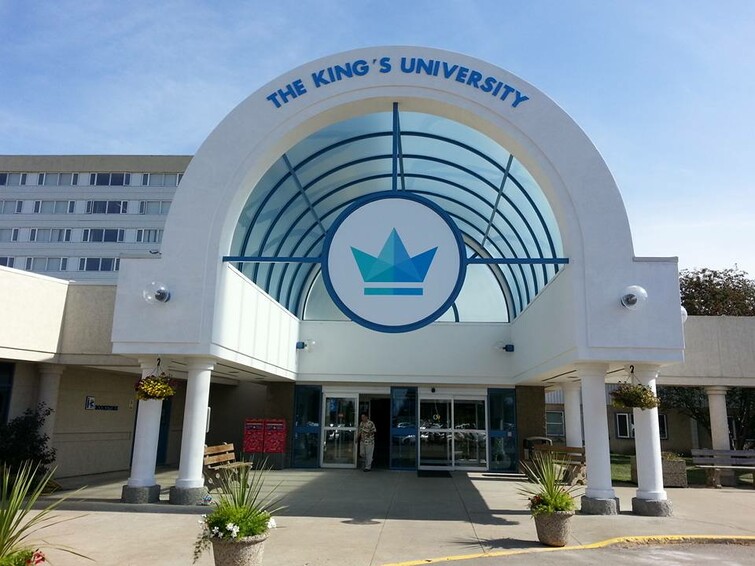
9125 50 St NW, Edmonton, AB T6B 2H3
Public Transit
King’s is serviced by a Crosstown route, the 53, and a Frequent route, the 4, which both run north and south on 50th street. Use the ETS Trip Planner website to plan your commute to King’s.
Bike Storage
Bikes can be securely stored in the following locations on campus:
– The bike cage located on the south side of the gym
– In one of the designated bike lockers in the front or west parking lot.
– The blue bike racks at the front entrance of the school.
Make sure you use a u-lock to secure your bike.
Parking
Parking lots: Parking stalls with and without power are available in the east and front entrance parking lot. The closest lot to the conference location is the one at the back of the building (east).
Note that some stalls closer to the building are reserved for employees or short term stays.
Street parking: Street parking is available for free directly adjacent to campus on both 91 avenue and 92 avenue.
